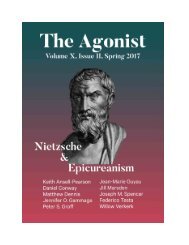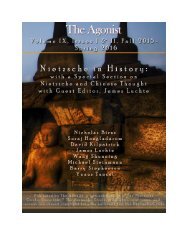Volume XII, Issue II, Spring 2019
Create successful ePaper yourself
Turn your PDF publications into a flip-book with our unique Google optimized e-Paper software.
BRIAN PINES<br />
with Pasquale D'Ercole, a professor at the University of Turin who shared many<br />
of his interests on matters of religion and the East. Nietzsche would write to<br />
D’Ercole before anyone else upon his arrival in Sils-Maria for the summer of 1888<br />
(KGB <strong>II</strong>I.5, p.326-7). Whether such intermittent exaggerations are serious<br />
impediments of this work is for the reader to decide. The wider impression the<br />
book gives is that Prideaux does quite an impressive job combining diligent<br />
scholarship with a spirited and imaginative writing style.<br />
Prideaux’s biography has the added dividend of following the story of<br />
Nietzsche’s sister, and the development of the Nietzsche legend. Prideaux’s<br />
observations concerning Elisabeth are imbued with a venomous humor. She<br />
illustrates with clarity and color Elisabeth’s shameless efforts to exploit first the<br />
colonists of Nueva Germania (the ‘racially pure’ colony she founded in Paraguay),<br />
and then her brother’s legacy. She conveys the inherent narcissism which<br />
motivated Elisabeth to portray Nietzsche as a living god, and to enlarge her own<br />
importance as his Pythia. Prideaux’s judgments are sometimes sharp and witty,<br />
such as her characterization of one of Elisabeth's vacation letters: “Unfortunately,<br />
Von Moltke caught a cold while taking a trip on the lake. ‘To the general dismay<br />
of all our party, [he] died,’ Elisabeth noted, but this did not long dent her<br />
cheeriness; ‘What happy and cloudless days were these three weeks in Lugano!’”<br />
(p.87). At other times she is appropriately damning of Nietzsche’s sister, likening<br />
her and her entourage to the tarantulas Nietzsche employed as a motif in<br />
Zarathustra. Most who are familiar with how much work was required to revive<br />
Nietzsche’s reputation after Elisabeth’s distortions will not feel Prideaux<br />
unjustified in her passionate assessments. There are even a few unsent drafts of<br />
letters Nietzsche wrote to his sister (KGB <strong>II</strong>I.5, p.218-20; p.237-8) in which he<br />
himself condemns Elisabeth with surprising malice, designating her as<br />
“superfluous,” informing her that “the hair-raising idea came to me that you have<br />
understood nothing, nothing of my illness,” and calling her his “former sister.”<br />
It is rare to find a scholar who writes a biography so aligned in terms of<br />
style with what their subject would have wished. Genius may necessitate at least<br />
a little madness, and Prideaux beautifully captures something of both, giving us<br />
an intimate and unique take on the Nietzsche legend.<br />
63









